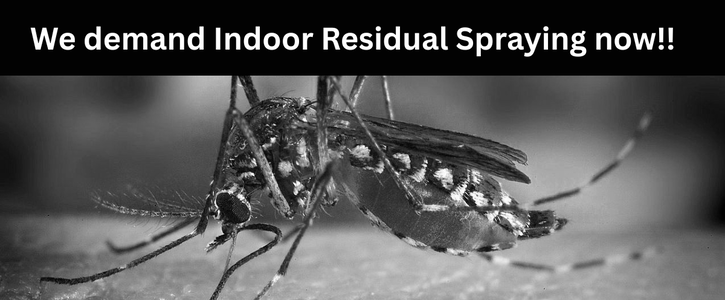To: Capricorn District Municipality Environmental Health Director, Dr Khathutshelo Vincent Mphaga and Mayor, Mamedupi Teffo
Provide Capricorn District Villages With Indoor Residual Spraying Once a Year
.png)
We, the undersigned, demand that Capricorn District Municipality provide villages with Indoor Residual Spraying (IRS) to protect them from mosquito infestations by doing the following:
- Ensure that every household in the district is rescued from mosquito infestation by getting residual spraying in their homes once a year.
- Teach communities about Indoor Residual Spraying (IRS) to avoid resistance.
Why is this important?
People in the Capricorn district continue to experience discomfort and poor living conditions due to uncontrolled mosquito infestations. The municipality must take urgent action to provide proper mosquito control and improve conditions in the district.
The Limpopo Department of Health recently advertised spray operator posts;[3] only 12 positions were advertised for the Capricorn district, which has over 400,000 households. While it is understandable that the Department of Health prioritises Mopani and Vhembe because they experience higher malaria cases, this focus overlooks challenges faced by other districts. The Capricorn district may not be suffering from malaria outbreaks, but it continues to live with severe mosquito infestations that affect their daily lives and comfort, which is not okay.
“I have to use some of my grant money to buy mosquito repellent products, which won’t even last me a month”, these are the words of an elderly woman, Maggie Malebana from Moletjie, a village outside Polokwane. “Over 20 years ago, we used to have spray operators come to our homes to get rid of mosquitoes,” She added.
Indoor Residual Spraying (IRS) has been one of Limpopo’s most effective ways to fight mosquito infestation for many years. The programme was introduced in 1932 and expanded in the 1990s through the Department of Health’s Malaria Control Programme.[4] Trained spray operators went door-to-door to spray once a year before the rainy season. Today, the IRS is limited to certain areas, leaving other districts, such as Capricorn, exposed to mosquito infestations that still affect people’s daily lives and wellbeing.
The Free State Department of Health is investigating a malaria outbreak in Luckhoff, an area that is considered non-endemic. This should demonstrate that mosquito infestations will eventually lead to malaria, even in areas considered “non-endemic”.[1]
The mosquito problem in the Capricorn district is not something that households can control with sprays and repellents; it is an infestation that requires measures on a larger scale to address through proper vector control measures.[2] The Capricorn district municipality must fulfil its responsibilities and ensure that every household receives Indoor Residual Spraying to prevent mosquito infestations. The municipality must recognise that mosquito control should not only be linked to malaria prevention but also to improving the overall living conditions of all Limpopo residents.
[2] Limpopo Department of Health's Mosquito Infestation Warning Statement, 29 January 2025, Facebook
.png)
